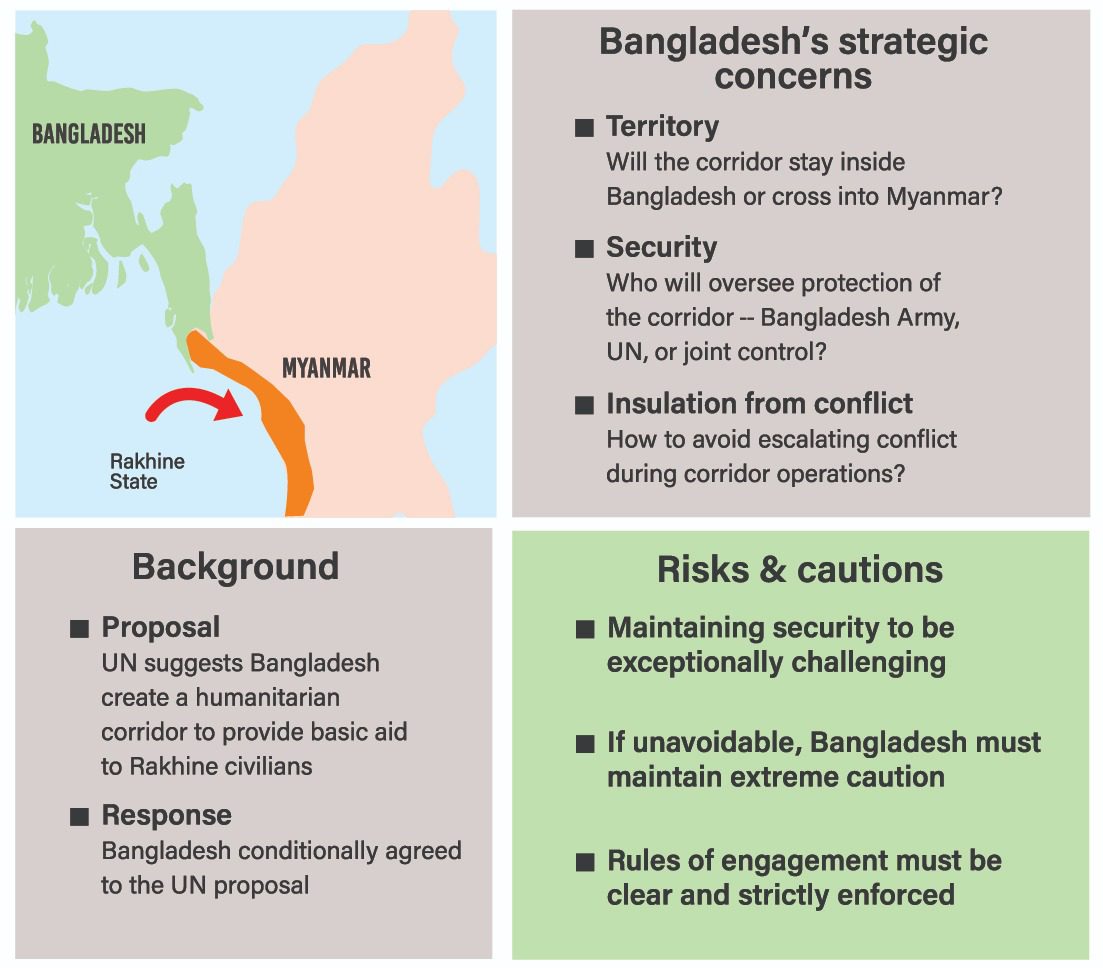Bangladesh has conditionally agreed to a United Nations request to establish a humanitarian corridor along its southeastern border to provide basic aid to civilians caught in Myanmar’s escalating conflict.
Foreign Affairs Adviser Md. Towhid Hossain announced the interim government’s in-principle decision, sending waves of both hope and concern across regional and global capitals — from New Delhi to Washington, and Beijing to Brussels, not to mention Naypyidaw.
International observers are now focused on Bangladesh’s operational plans, while domestic concern centres on whether Dhaka risks being drawn into Myanmar’s internal conflict — or worse, into a broader proxy war.
Explaining the UN’s proposal and Bangladesh’s position, Adviser Towhid Hossain said the UN seeks to deliver aid to Myanmar’s Rakhine State through Bangladeshi territory.
Bangladesh, he said, has agreed in principle but set several conditions. “It will be a humanitarian passage. But we have some conditions. I will not go into details. If the conditions are met, we will definitely help,” he said, without elaborating.
Towhid Hossain also hinted at a strategic calculation behind Dhaka’s willingness to cooperate: easing the path for the eventual repatriation of the nearly two million Rohingya refugees currently residing in Bangladesh after fleeing military crackdowns in 2017.
“The conflict in Myanmar is linked to Bangladesh’s interests,” he said. “A large population of Myanmar has taken refuge in our country and we want to send them back. We have to do whatever we need to do for their repatriation.”
The urgency is underscored by the worsening humanitarian situation in Rakhine.
Myanmar’s junta has cut off supplies to the region to pressure the Arakan Army insurgents, exacerbating a humanitarian crisis that prompted the UN’s intervention. As famine fears mount, the UN has turned to Bangladesh as a critical channel for aid delivery.
However, military analysts warn that humanitarian corridors, though designed for civilians, often present opportunities for rebels and criminal networks to exploit. Rakhine’s border areas are already said to be notorious for cross-border trafficking in arms and drugs.
Addressing these concerns, Towhid Hossain emphasised that “the corridor is considered for goods only; weapons will not be transported.”
Nonetheless, operating a corridor inevitably requires dealing — directly or indirectly — with non-state actors. The Myanmar junta has effectively lost control of large stretches of Rakhine to the Arakan Army.
“The entire border is under the control of a non-state actor,” Hossain admitted. “We cannot have formal contact with non-state actors. But complete isolation is not possible either. So we will maintain as much communication as necessary.”
Security experts stress the high operational risks.
Major General (Retd.) Mashud Razzaq, drawing on his experience in counter-insurgency in the Chittagong Hill Tracts, outlined the military complexities of managing such a corridor.
He noted that military logistics traditionally remain behind forward defense lines (FDL) and any operation beyond that requires extensive preparation and control measures. “In war, passages are designated carefully to separate civilians from combatants,” Razzaq said.
“Even then, it is extremely difficult to distinguish friend from foe.”
He added that maintaining security would be exceptionally challenging amid the expected influx of mixed elements posing as service providers or civilians. “How do you know their hidden agendas, purposes, intentions? Who supports whom? How can you ascertain if they are genuinely affected or not?” Razzaq questioned.
While Bangladesh’s armed forces have experience in UN peacekeeping operations, Razzaq warned that operating a domestic humanitarian corridor in a live conflict zone would be a new and far more complex challenge.
“If unavoidable, we must proceed with extreme caution. Rules of engagement must be clear and strictly enforced.”
As Bangladesh weighs its next steps, key strategic questions remain: Will the corridor remain strictly within Bangladeshi territory or extend into Myanmar? Who will oversee security operations? How can Bangladesh insulate itself from Myanmar’s internal conflict while still facilitating humanitarian access?
The decision to accept the UN’s proposal could significantly elevate Bangladesh’s international standing if managed successfully. But mishandling it could entangle Dhaka in a volatile conflict, undermining national security and complicating the very refugee crisis it seeks to resolve, said General Razzaq.


